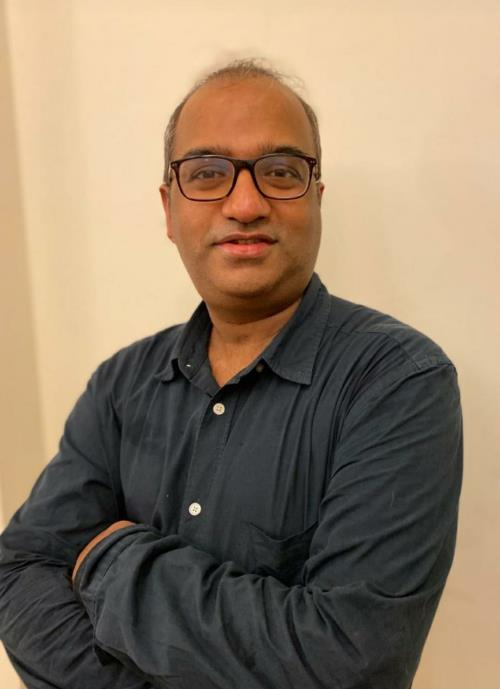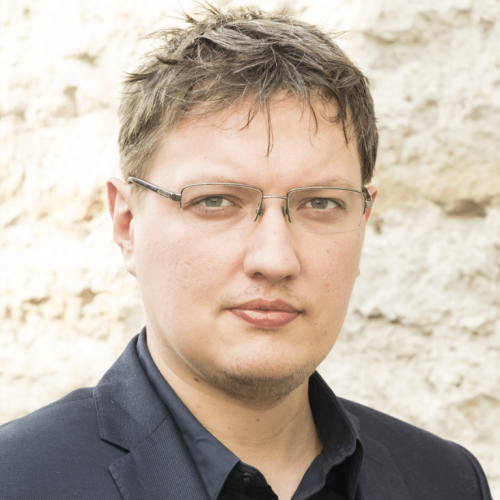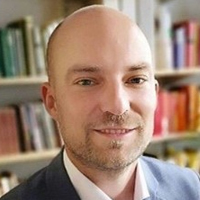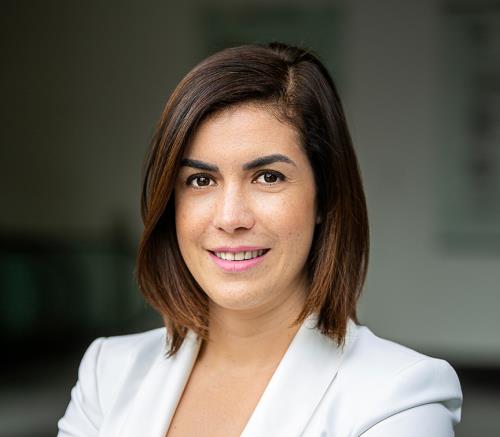1st Episode of the GovStack CIO Leaders Forum
Germany, Estonia, International Telecommunications Union and the Digital Impact Alliance
Session 349
Country experiences: Estonia and India
Join the 1st Episode of the GovStack CIO Leaders Forum where Government CIOs from Estonia and India will share their country's experience in digitization of government services using a building block approach.
CIO's will present their country’s digital strategy, the government’s enterprise architecture, the road map and progress on the digitization of government services, as well as, lessons learned.
An interactive session for Q&A will take questions and comments from remote participants, as well as, participants present in the conference room after each country case presentation.

Shri Abhishek Singh is an officer of the 1995 batch of IAS with diverse experience of governance and policy formulation with regard to use of Technology for improving Governance.
He is presently posted as President & CEO NeGD with additional charge of MD&CEO, Digital India Corporation and CEO MyGov. In his role at National e Governance Division, he coordinates projects relating to Digital India, specially Digilocker, UMANG, Geo-Informatics. He has also been leading the efforts on Communications on COVID19.
He has done Masters in Public Administration from Harvard Kennedy School of Government as a Mason fellow in May 2013. He is a B Tech and M Tech in Mechanical Engineering from IIT Kanpur.
He has worked in diverse Indian States of Nagaland and Uttar Pradesh.

Kristo Vaher is responsible for architecture vision and technology strategy, development principles and interoperability standards and requirements for the government technology stack. Managing and coordinating a community of government engineers and private sector partners. Leading a team responsible for government cloud, platform services, artificial intelligence and other emergent initiatives.

David Roos is the Deputy Head of the Sector Programme Digital Development. The Sector Programme advises and supports German development cooperation actors in applying digital approaches and methods. The programme thus contributes to implementing BMZ's position paper 'Digitalisation for Development' and the German Government's 'Digital Strategy'. David Roos is currently involved in providing assistance to several developing countries by advising on digital applications and services strategies and policies - particularly on digital government.
David Roos has 10 years of on-the-ground experience in IT and software development projects. David Roos led several large digitization projects for the Federal Ministry of the Interior, Building and Community (Germany) and the Federal Employment Agency around digital ID and the development of interoperable government platforms. David Roos led the IT Planning Council project "Online-Gateway" for the CIO of Germany. By 2022, the federal and state governments are to offer all administrative services in Germany digitally via administrative portals and link these portals into a network. With friends David Roos started the social business Quartiermeister. Quartiermeister is a Berlin social start up, consisting of a social enterprise and an association. While the enterprise takes care of selling and merchandising beer, the association is responsible for the allocation of funding and regulates the business operation.
David Roos has an educational background in Political Science and Public Administration and has studied at the University of Konstanz, Germany and the Marmara Üniversitesi Istanbul, Turkey.

Sherman Kong is most committed to achieve development impact through informed data-driven decision making and technology-aided efficiency, a principle he reinforces through DIAL by helping to advance the ICT4SDG body of work and to apply the Digital Investment Framework in practice. He has past experience in health systems and digital innovation, data management, and facilitation of knowledge by research and policy priorities.
Prior to DIAL, he served as the Coordinator of the Malaria Eradication Scientific Alliance (MESA) hosted at the Barcelona Institute of Global Health (a WHO Collaborating Center), with overall team leadership and programmatic oversight into translation of sector-wide malaria R&D direction and identification of scientific knowledge gaps (and management of technical informational synthesis activities thereof), and support harmonization of relationships with funding agencies, Steering Committee, WHO and other partners. Between 2014 and 2017, Sherman acted as an independent advisor for the Office of the President at Globe Telecom, focusing on digital health development that intersected between private and public sectors of the Philippines. He had lent technical assistance to WHO-WPRO, UN-Habitat, UNDP Guinea-Bissau, Grameen Foundation and other INGOs on thematic review and project evaluation. He also formerly came with a 6-year specialization on information strategy and business intelligence in corporate consultancy settings, inclusive of leading big-data reporting system implementations.
Sherman was awarded a Master's in Health Economics and Policy from the Barcelona Graduate School of Economics, and a Bachelor's in Electrical Engineering from the University of Toronto, both with dissertations centered around heath innovation.

Yolanda Martínez currently works as International Telecommunications Union (ITU) overall lead for GovStack Initiative, helping governments accelerate the digitization of government services. In the public sector, Yolanda led the National Digital Strategy of Mexico, the digital government unit at the federal level, and the Zapopan Digital City Program at the local level. She has led several digital transformation initiatives in the private sector while at Deloitte Consulting. In the international arena, Yolanda led the Office of the Inter-American Development Bank (IDB) in Chile, has collaborated with United Nations agencies, and joined OECD as a peer reviewer for the digital government strategies of various Latin American countries.
Yolanda has been recognized by @political as one of the twenty most influential people globally in digital government. She holds a Ph.D. degree in information and knowledge society from the Open University of Catalonia (UOC).
_23.44.27.png?maxwidth=500)
Valentina has had a passion for leadership and innovation in ICT from a young age.
At 17, she began her studies in Information Systems Engineering at the "Universidad Abierta Interamericana" in Argentina.
After two years, she started her first job in the technology field as a Frontend Developer and participated in mentoring programs to help low-income women find jobs in IT. Realizing the potential of these women, Valentina decided to start helping other women take their first steps in STEM.
Currently, Valentina works as a Web Developer intern at ITU and in the Legal IT department of a Swiss pharmaceutical company. She is about to finish her Bachelor's studies, after which she plans to start Master's studies in IT Business Analyst.
In her spare time, she is dedicated to organizing and participating in activities together with the Generation Connect Europe Youth Group with the aim to contribute to making a change in people's lives and end the connectivity gap. In the future, she would like to open a foundation in underdeveloped countries where women can find a safe and accessible place to develop in the STEM world.
-
 C1. The role of governments and all stakeholders in the promotion of ICTs for development
C1. The role of governments and all stakeholders in the promotion of ICTs for development
-
 C2. Information and communication infrastructure
C2. Information and communication infrastructure
-
 C3. Access to information and knowledge
C3. Access to information and knowledge
-
 C4. Capacity building
C4. Capacity building
-
 C5. Building confidence and security in use of ICTs
C5. Building confidence and security in use of ICTs
-
 C6. Enabling environment
C6. Enabling environment
-
 C7. ICT applications: benefits in all aspects of life — E-government
C7. ICT applications: benefits in all aspects of life — E-government
-
 C7. ICT applications: benefits in all aspects of life — E-business
C7. ICT applications: benefits in all aspects of life — E-business
-
 C7. ICT applications: benefits in all aspects of life — E-learning
C7. ICT applications: benefits in all aspects of life — E-learning
-
 C7. ICT applications: benefits in all aspects of life — E-health
C7. ICT applications: benefits in all aspects of life — E-health
-
 C7. ICT applications: benefits in all aspects of life — E-employment
C7. ICT applications: benefits in all aspects of life — E-employment
-
 C7. ICT applications: benefits in all aspects of life — E-environment
C7. ICT applications: benefits in all aspects of life — E-environment
-
 C7. ICT applications: benefits in all aspects of life — E-agriculture
C7. ICT applications: benefits in all aspects of life — E-agriculture
-
 C7. ICT applications: benefits in all aspects of life — E-science
C7. ICT applications: benefits in all aspects of life — E-science
-
 C8. Cultural diversity and identity, linguistic diversity and local content
C8. Cultural diversity and identity, linguistic diversity and local content
-
 C11. International and regional cooperation
C11. International and regional cooperation
-
 Goal 5: Achieve gender equality and empower all women and girls
Goal 5: Achieve gender equality and empower all women and girls
-
 Goal 10: Reduce inequality within and among countries
Goal 10: Reduce inequality within and among countries
-
 Goal 16: Promote just, peaceful and inclusive societies
Goal 16: Promote just, peaceful and inclusive societies
https://www.govstack.global/
@GovStackGlobal
https://www.linkedin.com/company/govstack/